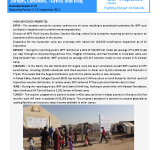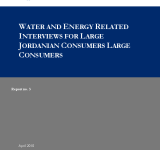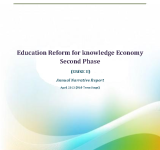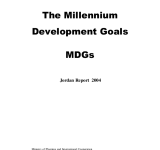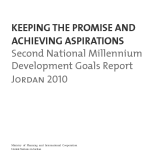monitoring
This report addressed CEDAW Committee by providing a solid and up-to-date information set and analysis of positive policies and legislation taken for women’s advancement and weaknesses that are delaying progress and sustaining disparities. The report covers six components: 1. Jordan’s reservations on CEDAW;; 2. Harmonization of CEDAW into legislation;; 3. Political representation;; 4. Violent against women;; 5. Equal rights in the family;; 6. Conditions of vulnerable and marginalized women. It also provides an overall assessment of the six components covering 3 areas: assessment of the official efforts towards the implementation of CEDAW;; also;; assessment of the civil society efforts and strategies towards monitoring Jordan’s commitment to obligations;; and suggested recommendations for the new concluding observations.
During the reporting period;; World Food Programme (WFP) distributed a total of 340;;000 hot meals (an average of 52;;000 meals per day) through its implementing partners TUA;; Thaghar Al Madina;; and Radi Shedifat in Al Za'atari camp and King Abdullah Park. In addition;; WFP provided an average of 4;;213 welcome meals to new arrivals in Al Za'atari Camp. The following report details such endeavors.
The report aims to better understand and quantify the attitude and the levels of awareness amongst large consumers of water and energy;; and it presents the findings of the interviews conducted with a representative sample of large consumers to better understand trends and behaviors related to water and energy consumption. The research was conducted as part of the Jordan Public Action in Water;; Energy;; and Environment Project (PAP) under the Prosperity;; Livelihoods;; and Conserving Ecosystems (PLACE);; which aims to initiate and establish clear and identifiable behavioral changes amongst the Jordanian public and decision-makers. The study categorizes large consumers into a number of main sectors including hotel and restaurant sectors;; commercial sector;; hospitals;; government buildings and industrial sector;; and the field surveys were collected as a random sample of different industries;; state and commercial buildings. The research finds that the majority of large consumers neither monitor their water nor their energy consumptions via sub-metering scheme;; showing that the majority of large consumers are not able to accurately determine the areas within their establishments that are the most consuming. This finding identifies four major obstacles in implementing the water and energy saving practices including;; lack of awareness;; lack of incentive programs amongst employees;; higher prices for higher quality savings devices and lack of proper maintenance.
The second phase of the Program Education Reform for the Knowledge Economy Program (ERfKE II) continues to build on the achievements of the first phase and follow the same implementation arrangements that have proven to be successful in (ERfKE I);; and in the same time;; focuses on schools as the locus of change as well as on the need to enhance capacity building at the central and field levels. The development objective of (ERfKE II) is to provide students enrolled in pre-tertiary education institutions in Jordan with increased levels of skills to participate in knowledge economy. Also the Mid-Term review highlighted the concrete progress achieved by (ERfKE II) in several key areas related to policy development;; quality of education interventions and school construction;; and identified the key issues as a summary of the overall progress that will be tackled and addressed during the remaining stage of implementation.
The Millenium Development Goals Report has been prepared through the active participation of the Jordanian Government and the UN Country Team. As scorekeeper of the MDGs;; UNDP supported the Ministry of Planning and International Cooperation in this joint endeavor. The objectives of this report are to create a baseline situation;; monitor progresses made to date;; and indicate what should be done in order to achieve the MDGs. The concluding section of fostering global cooperation gives an overview of national efforts to strengthen the basis and improve the environment for developing strong partnerships to achieve macroeconomic stability and other important national objectives.
Jordan’s second Millennium Development Goals Report 2010 shows the extent to which progress has been made towards achieving those targets and highlights the challenges that still confront the country to achieve these goals. The report seeks to identify the policies required for meeting the MDG targets by the year 2015;; at a time when the United Nations and the World’s governments are exerting a collective effort to review the progress achieved to date and identify the obstacles standing in the way of meeting the goals and targets by 2015.

